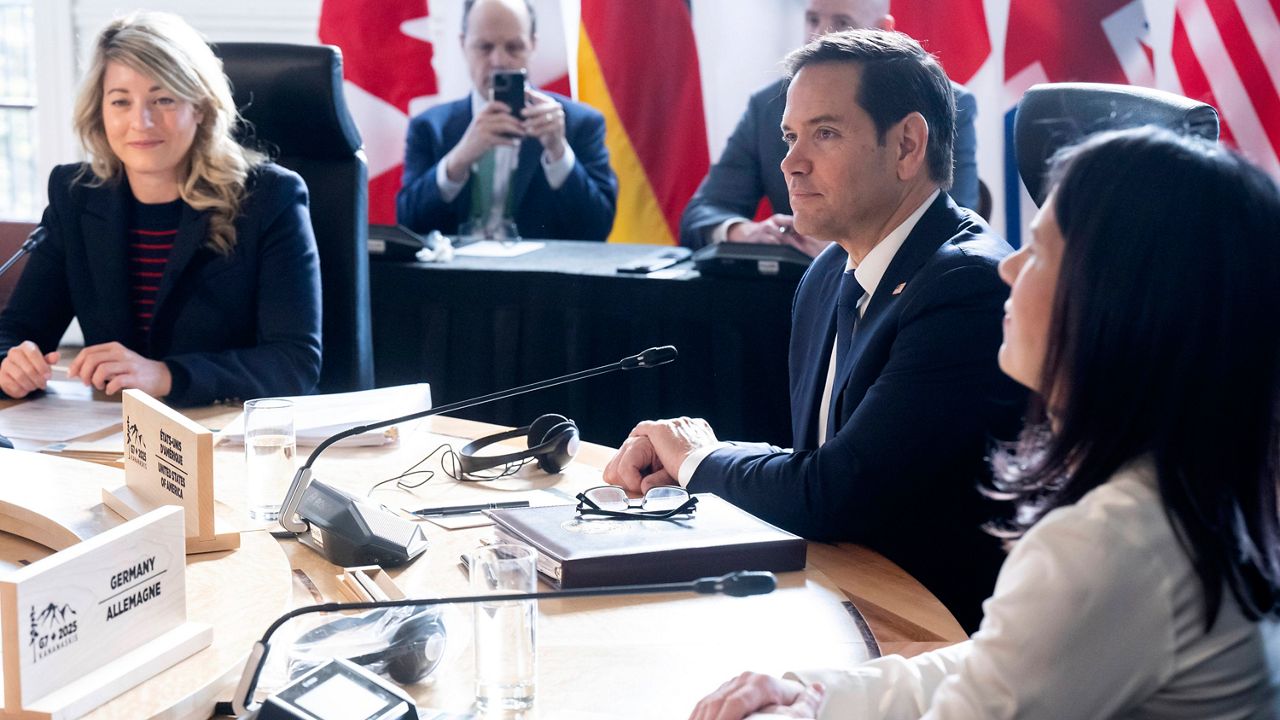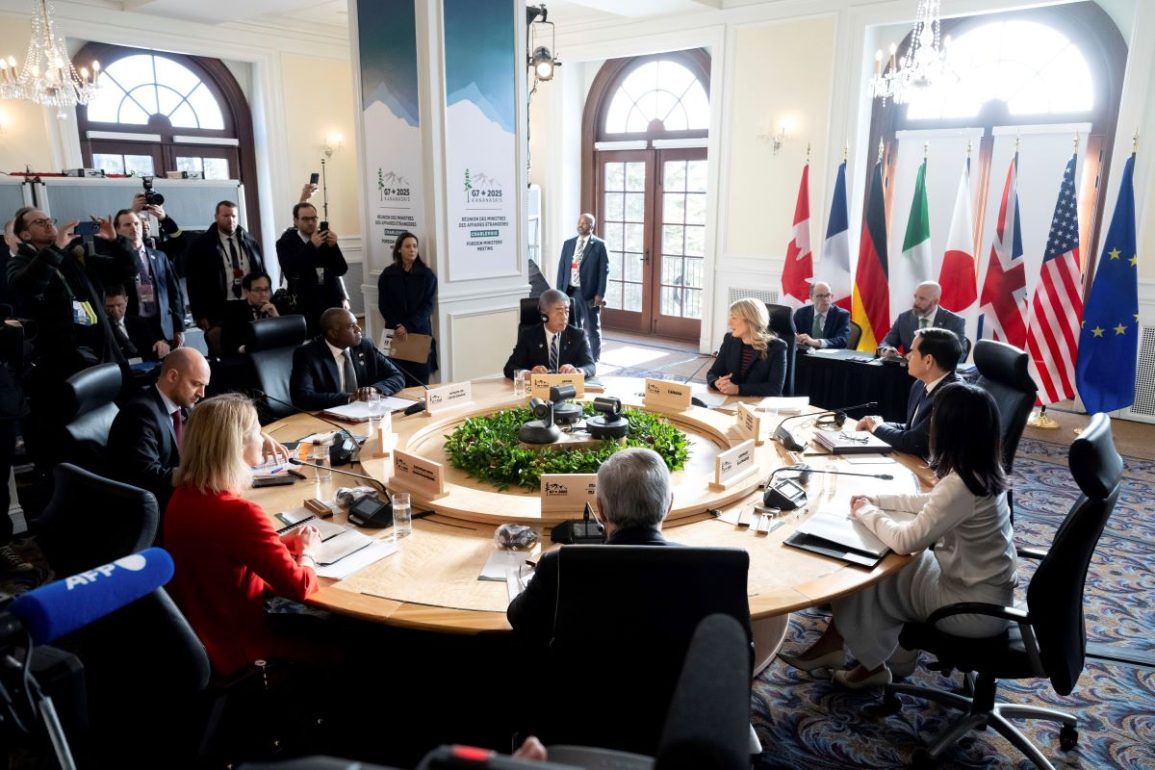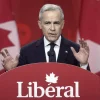Top diplomats from the Group of 7 (G7) industrialized democracies convened in Canada on Thursday as U.S. President Donald Trump’s trade and foreign policies continued to challenge the bloc’s once-solid unity.
The gathering took place just after Trump threatened to impose 200% tariffs on European wine and other alcoholic beverages if the European Union did not back down from retaliating against U.S. steel and aluminum tariffs by placing levies on American whiskey.
This escalating trade dispute further strains the relationships between the U.S. and its closest allies, which have already been tested by Trump’s stance on Russia’s war in Ukraine.
U.S. Secretary of State Marco Rubio arrived in Quebec for the meeting, disembarking from a military aircraft at Quebec City Jean Lesage International Airport on March 12, 2025.
Over the next two days, he is expected to meet with the foreign ministers of Britain, Canada, France, Germany, Italy, and Japan, all of whom have expressed frustration with the new American administration’s policies.
Posing for a group photo in the freezing temperatures of La Malbaie, Quebec—a snowy resort along the St. Lawrence River—the ministers exchanged stiff smiles, reflecting the tension in the air.
Trade Disputes and Security Concerns Take Center Stage
At the opening of the meetings, Canadian Foreign Minister Mélanie Joly outlined the group’s priorities, emphasizing ongoing support for Ukraine.
“Peace and stability is at the top of our agenda, and I look forward to discussing how we continue to support Ukraine in the face of Russia’s illegal aggression,” Joly stated. “Of course, we want to foster long-term stability as well in the Middle East.”
Rubio had arrived in Canada late Wednesday, just hours after Trump’s steel and aluminum tariffs took effect—prompting swift responses from both the European Union and Canada.
Before traveling to Canada, Rubio had been in Saudi Arabia, where he secured Ukraine’s agreement to a 30-day ceasefire in the ongoing war, pending Russia’s approval. He downplayed concerns that he would receive a hostile reception from his G7 counterparts.
Canada Stands Firm Against U.S. Tariffs
Joly, hosting the G7 meeting, made it clear that Canada would not back down. Trump has repeatedly singled out Canada, with talk of it becoming the 51st U.S. state, additional tariffs, and ongoing criticisms of its leadership.
Before the talks, Joly vowed to challenge the U.S. tariffs. “In every single meeting, I will raise the issue of tariffs to coordinate a response with the Europeans and to put pressure on the Americans,” she said, pointing out that Trump had once again used his “disrespectful 51st state rhetoric.”
Trump, meanwhile, doubled down on his stance during an Oval Office meeting with NATO chief Mark Rutte on Thursday.
“To be honest with you, Canada only works as a state,” Trump remarked, adding that he had no intention of reversing the tariffs. “We’ve been ripped off for years,” he said. “We’re not going to bend.”
Rubio attempted to downplay Trump’s remarks, insisting that the president was merely sharing his perspective on what he believed to be a reasonable idea. “The G7 is not a meeting about how we’re going to take over Canada,” Rubio stated.
In response, German Foreign Minister Annalena Baerbock urged the G7 to remain composed and posted a message of solidarity with Canada on X, featuring a photo with EU foreign policy chief Kaja Kallas. “We’ve got your back, @melaniejoly,” she wrote, adding “#Canada #Solidarity.”

Baerbock emphasized the importance of staying calm despite geopolitical tensions. “We have learned altogether in these shaky geopolitical times … especially in moments when your heart is really beating, it’s important to keep calm,” she said.
She also highlighted the G7’s role as “a powerhouse … for freedom, for our common understanding of peace.”
Rubio Defends U.S. Tariff Policy
Addressing concerns over tariffs, Rubio insisted that G7 partners should understand Trump’s decisions as necessary to safeguard American competitiveness.
“I think it is quite possible that we could do these things and at the same time deal in a constructive way with our allies and friends and partners on all the other issues that we work together on,” Rubio told reporters during a refueling stop in Ireland on Wednesday. “And that’s what I expect out of the G7 and Canada.”
Asked whether he expected a difficult reception from his counterparts, Rubio dismissed the question. “I don’t know, should I be? I mean, they’ve invited us to come. We intend to go. The alternative is to not go. I think that would actually make things worse, not better.”
Notably, Rubio had skipped a meeting of G20 foreign ministers last month in South Africa, citing concerns that the agenda—which included discussions on climate change and diversity—did not align with Trump administration priorities.
The G7 meeting’s agenda covers a range of topics, including China and the Indo-Pacific, Ukraine and Europe, stability in the Americas, the Middle East, maritime security, Africa, and ongoing challenges involving China, North Korea, Iran, and Russia.
U.S. Pushes for a Ceasefire in Ukraine
Earlier in the week, Rubio and Trump’s national security adviser, Mike Waltz, had been in Jeddah, Saudi Arabia, working on what could be a significant diplomatic achievement for the administration—a potential ceasefire in the Russia-Ukraine war, a topic that has dominated G7 discussions since before the conflict began.
Trump’s special envoy, Steve Witkoff, arrived in Russia on Thursday for talks with officials regarding the proposal.
Russian President Vladimir Putin stated Thursday that he was open to the U.S. ceasefire proposal in principle but stressed that the details needed further negotiation, emphasizing the need for a pathway toward lasting peace.
“So the idea itself is correct, and we certainly support it,” Putin said during a press conference in Moscow. “But there are issues that we need to discuss, and I think that we need to discuss it with our American colleagues and partners.”
G7 officials did not immediately comment on Putin’s remarks, but reactions were expected to be cautiously optimistic.
Still, Trump’s apparent eagerness to reengage with Russia—particularly his repeated statements that he would like to see Russia reinstated in the G7 to restore it to the G8—continues to unsettle other members. Russia was expelled from the G8 in 2014 after its annexation of Crimea from Ukraine.
Historically, the G7—comprised mainly of NATO allies, with Japan as the exception—has taken a strong stance against Russia.
At the last G7 foreign ministers’ meeting before the full-scale invasion in February 2022, members issued a joint warning in December 2021, stating that Russia would face “massive consequences” if it attacked Ukraine.
When the invasion occurred three months later, the G7 coordinated sweeping sanctions against Moscow, targeting financial assets, travel, and trade.
However, since Trump’s election, the U.S. approach appears to be shifting.
Rubio emphasized that the administration’s objective was not to provoke Russia while it considered the ceasefire proposal. “By issuing statements that are abrasive in any way,” he said, “we risk jeopardizing the discussions.”
He reassured that all existing sanctions on Russia remained in effect but suggested that further threats of punitive measures could hinder efforts to bring Putin to the negotiating table.
This raises doubts about whether the G7 can maintain a united front in condemning Russia, as tensions persist over the Trump administration’s evolving approach to the conflict.


